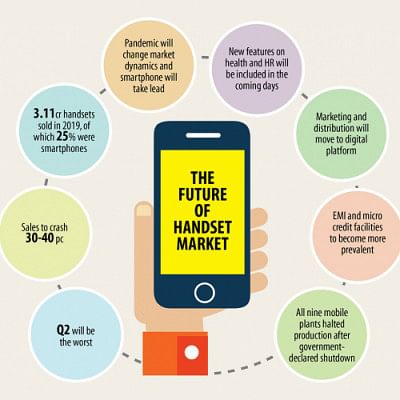Smartphones to rule in the post-pandemic era

As a matter of course, the coronavirus pandemic is leaving new lessons for all spectra of life and across all sectors. The mobile phone industry is no exception.
The needs emerging due to the novel virus are expected to change the entire handset business dynamics as people are now using their devices for various unconventional purposes like holding office meetings, taking academic classes and seeking healthcare, said top assemblers and importers.
Manufacturers will go for new approaches in marketing and distribution while spending lavishly on research and development to incorporate new features and designs that best suit the necessities of the post-coronavirus era.
The handset vendors said the second quarter of the year will be the worst in the history of the country's mobile device business, but this will leave a word of warning that could help them grow further in the days to come.
Sales of mobile devices including feature phones and smartphones were almost zero in April because of the government-announced holidays and lockdowns put in place since March 26, vendors said.
Subsequently, sales in the first four months of the year have been 15-20 per cent short of the target but the overall impact depends on how long the pandemic will linger, said Mesbah Uddin, chief marketing officer at Fair Group that assembles Samsung mobile devices in Bangladesh.
"People are now using a wide array of digital services, which give us a glimmer of hope that smartphone sales will jump in the coming days."
Amid the growing demand for online-based services to head off the risks of coronavirus infections, a big number of users will shift from feature phones to smart devices.
"And if this happens, the mobile phone industry will be one of the biggest in the country," Mesbah added.
The industry sold about 3.11 crore imported and locally assembled handsets last year, of which 25 per cent were smartphones.
Smartphones will account for 40 per cent of the total sales of mobile devices in the next one year, said Rezwanul Haque, chief executive officer of Transsion Bangladesh that makes Techno brand smartphones and itel feature phones.
"Though we are facing some headwinds, the pandemic could prove a game-changer," he said, adding that once normalcy returns, the next one year will be excellent for the handset industry.
People are now conducting office meetings via mobile devices and increasingly using smart devices for entertainment, bill payments and healthcare services.
"In the coming days, features related to healthcare and human resources management will be incorporated in the smartphones as people are getting used to such services at a faster pace," said Haque, also the former general secretary of the Bangladesh Mobile Phone Importers Association.
Transsion was making five lakh pieces of phones every month and was planning to expand operations, but their production came to a halt, like the other mobile assembly factories in Bangladesh, for the shutdown.
To cope with the emerging situation, industry insiders said vendors will recalibrate their strategies and focus more on online channels for the distribution and marketing of their products.
In recent times, online sales comprised less than 2 per cent of the total sales, while the rate is more than 50 per cent in the Indian market that sells about 26 crore units of handsets a year, Haque added.
"Online outlets should grow a better sense of responsibility and come up with innovations," said Farhan Rashid, head of business at the Bangladesh chapter of HMD Global Oy, the exclusive licensee of Nokia phones.
Vendors will have to look for some ways to reduce prices and improve the service quality in the post-coronavirus days as people are expected to have less to spend on non-essentials.
"We should not only sell products but also improve services such that we can offer a complete solution to customers," he added.
Eid-ul-Fitr and Pahela Baishakh are two of their peak seasons but these are going to generate depressing sales this year, which is why the overall annual sales may witness a 30-40 per cent cut, Rashid said.
Handset assemblers and importers said they registered a 15 per cent decline in sales in the January-March quarter of 2020 from a year earlier.
Companies' digital readiness could be a major factor in the post-coronavirus era as firms with strong digital presence would do better in future, said Ziauddin Chowdhury, country general manager of Xiaomi in Bangladesh.
Industry experts said flexible payment options like equal monthly instalment and micro-credit facilities, which are yet to flourish in Bangladesh, may open a window of opportunities in future and hence a regulatory framework should be readied as soon as possible.

 For all latest news, follow The Daily Star's Google News channel.
For all latest news, follow The Daily Star's Google News channel. 



Comments